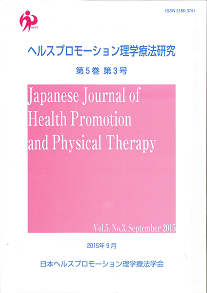Volume 5, Issue 3
Displaying 1-7 of 7 articles from this issue
- |<
- <
- 1
- >
- >|
ORIGINAL ARTICLES
-
2015 Volume 5 Issue 3 Pages 107-112
Published: September 07, 2015
Released on J-STAGE: September 10, 2015
Download PDF (340K) -
2015 Volume 5 Issue 3 Pages 113-116
Published: September 07, 2015
Released on J-STAGE: September 10, 2015
Download PDF (269K) -
2015 Volume 5 Issue 3 Pages 117-121
Published: September 07, 2015
Released on J-STAGE: September 10, 2015
Download PDF (266K) -
2015 Volume 5 Issue 3 Pages 123-127
Published: September 07, 2015
Released on J-STAGE: September 10, 2015
Download PDF (425K)
SHORT REPORT
-
2015 Volume 5 Issue 3 Pages 129-133
Published: September 07, 2015
Released on J-STAGE: September 10, 2015
Download PDF (341K) -
2015 Volume 5 Issue 3 Pages 135-138
Published: September 07, 2015
Released on J-STAGE: September 10, 2015
Download PDF (252K)
FIELD REPORT
-
2015 Volume 5 Issue 3 Pages 139-143
Published: September 07, 2015
Released on J-STAGE: September 10, 2015
Download PDF (339K)
- |<
- <
- 1
- >
- >|
